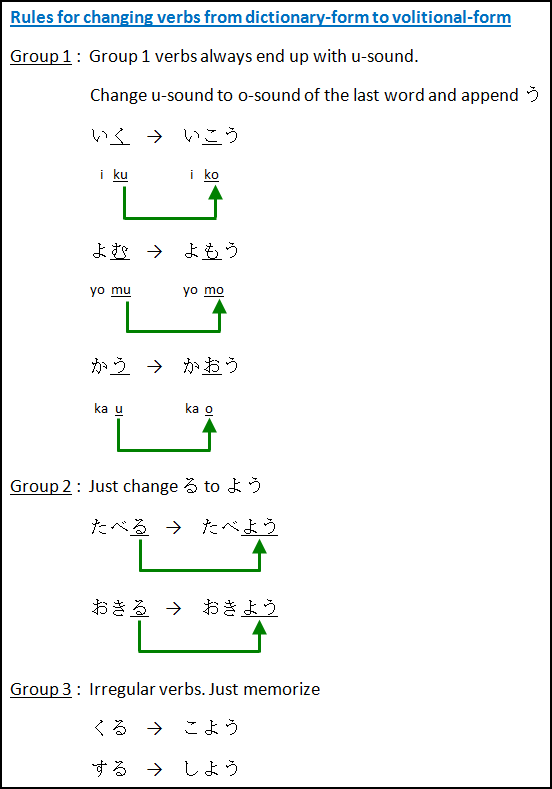- Home
- Intermediate Lessons
- Japanese Grammar for Intention
Japanese Grammar for Intention -
Intermediate Lessons: 9
In this lesson you will get to learn the Japanese grammar used to express your intention of doing something.
In fact there are two of them: つもり tsumori and the volitional-form or 意向形 (ikoukei).
Be careful that since these grammars are used to express your own intention to do something, you cannot use them to express intentions of other people.
Let's look at the first Japanese grammar つもりです (tsumori desu).
つもり tsumori
This grammar is often used to express definite intention or firm determination of the speaker. The sentence patterns for this grammar are as follow...
1. (私は) Verb (dictionary-form) つもりです
(watashi wa) Verb (dictionary-form) tsumori desu
Meaning: I intend to do ~.
2. (私は) Verb (nai-form) つもりです
(watashi wa) Verb (nai-form) tsumori desu
Meaning: I intend not to do ~.
For example, you can say this...
- 夏休みに日本へ行くつもりです。
natsu yasumi ni nihon e iku tsumori desu
Meaning: I intend to go to Japan this summer holiday.
You can say the above since it's just your intention only. However if you are 100% sure that you are going, you will normally say this instead...
- 夏休みに日本へ行きます。
natsu yasumi ni nihon e ikimasu
Meaning: I will go to Japan this summer holiday.
And if you intend not to go anywhere, you should say this...
- 夏休みにどこへも行かないつもりです。
natsu yasumi ni doko emo ikanai tsumori desu
Meaning: I intend not to go anywhere this summer holiday.
Let's use another example that uses this Japanese grammar...
- 今晩そばを食べるつもりです。
konban soba wo taberu tsumori desu
Meaning: I intend to eat soba this evening.
- 今晩何も食べないつもりです。
konban nani mo tabenai tsumori desu
Meaning: I intend not to eat anything this evening.
Volitional-form or 意向形 (ikoukei)
This Japanese grammar is also used to express speaker's intention.
Normally the volitional-form is not used alone but in conjunction with ~と思っています(~to omotte imasu) or ~と思います(~to omoimasu).
The sentence pattern is as follow...
(私は) Verb (volitional-form) と思っています
(watashi wa) Verb (volitional-form) to omotte imasu
Meaning: I am thinking of doing ~.
Using the same example of intending to go to Japan, you can say the following sentence...
- 夏休みに日本へ行こうと思っています。
natsu yasumi ni nihon e ikou to omotte imasu
Meaning: I am thinking of going to Japan this summer holiday.
行こう (ikou) is the volitional-form of the verb 行く (iku). So how are you going to change the verb to volitional-form?
Rules for Changing dictionary-form to volitional-form
The following are the rules for the 3 groups of Japanese verbs.
Group 1 Verbs
Group 1 verbs always end up with words containing u-sound.
To change group 1 verbs to volitional-form, change the u-sound to o-sound in the last word. After that append う (u) to the changed words and you will get the volitional-form of the verb.
For example, this group 1 verb よむ (yomu) ends up with む (mu). If you change the u-sound to o-sound, む (mu) becomes も (mo). Adding う (u) at the end, you will get よもう (yomou).
Let's look at one more example, this group 1 verb かえる (kaeru) ends up with る (ru). If you change the u-sound to o-sound, る (ru) becomes ろ (ro). Adding う (u) at the end, you will get かえろう (kaerou).
Group 2 Verbs
Changing of group 2 verbs is always much simpler as usual.
All group 2 verbs end up with る (ru). To change to volitional-form, simply replace る (ru) with よう (you) and you will get the volitional-form of the verb.
For example, this Japanese verb たべる (taberu) is a group 2 verb. To change to volitional-form, replace る (ru) with よう (you) and you will get たべよう (tabeyou).
Let's use another example to show the change. This group 2 verb ねる (neru) means go to bed. Change る (ru) to よう (you) and you will get ねよう (neyou).
Group 3 Verbs
Group 3 verbs are irregular verbs. You just have to memorize them. The volitional-form of くる (kuru) is こよう (koyou) and the volitional-form of する (suru) is しよう (shiyou).
In summary, the following diagram shows the rules when changing dictionary-form to volitional-form for Japanese verbs.

Examples
Let's make some sentences to express your intention of doing something using this Japanese grammar (volitional-form). See how each verb was changed to its volitional-form.
|
1. |
(私は)泳ごうと思っています。 |
|
2. |
本を読もうと思っています。 |
|
3. |
友達と遊ぼうと思っています。 |
|
4. |
日本料理を食べようと思っています。 |
|
5. |
十時に寝ようと思っています。 |
|
6. |
コートを着ようと思っています。 |
|
7. |
六時に起きようと思っています。 |
|
8. |
勉強しようと思っています。 |
Be Careful on Question Using the Japanese Grammar for Intention
If you want to ask someone if he or she intends to go to Japan in this summer holiday, it's natural that you will say this...
- 夏休みに日本へ行くつもりですか。
natsu yasumi ni nihon e iku tsumori desu ka
or
- 夏休みに日本へ行こうと思っていますか。
natsu yasumi ni nihon e ikou to omotte imasu ka
However, it's definitely not a good idea to ask questions on what other people intending to do in these ways.
Because these questions contain meanings like "What are you up to?" or "I know what you are going to do something. How dare you do do such a thing?".
It's more like questioning other people intention rather than your original meaning of "if he or she intends to go to Japan".
It's considered rude to ask questions in these ways. Therefore please refrain from asking questions using the Japanese grammar for intention.
If you really want to ask someone's intention, ask the question using the present tense like...
- 夏休みに日本へ行きますか。
natsu yasumi ni nihon e ikimasu ka
Meaning: Are you going to Japan in this summer holiday?.
And if that someone has the intention to go to Japan, he or she can answer you using つもりです (tsumori desu) or volitional-form.
Take The Challenge Sales! Get 45% OFF Premium & Premium PLUS! Ends on 16 Jan 2026
Click Here to Get 45% OFF Premium & Premium PLUS and be on the fast track to fluency in Japanese.
The link above is an affiliate link, which means that I would earn a commission (at no extra cost to you) if you do end up purchasing the related learning course.
Previous - Lesson 8: Japanese Expressions dake shika
Buy me a coffee








Facebook Comments
Don’t see the comments box? Log in to your Facebook account, give Facebook consent, then return to this page and refresh it.